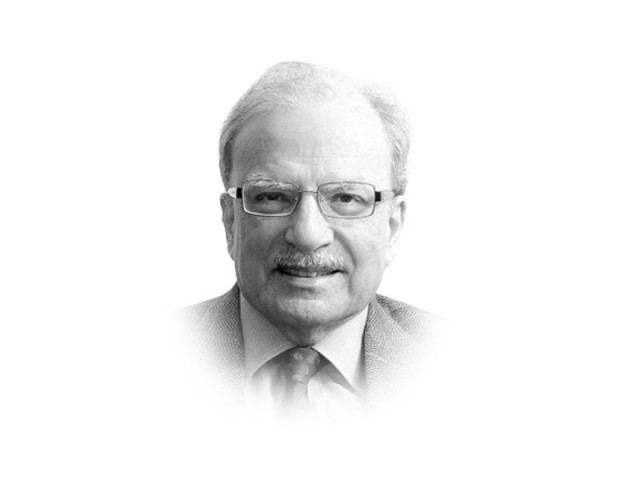Trump’s Riyadh speech and its implications for Muslim world
Trump's approach towards the Muslim world will have consequences for years to come

The writer is a former caretaker finance minister and served as vice-president at the World Bank
The Trump White House showed extraordinary lack of sensitivity to the growing and negative Muslim sentiment about the new presidency by entrusting to Miller the task of preparing the draft of the Riyadh speech. According to a story in the Los Angeles Times, the initial Miller draft was revised after input from Jared Kushner, Trump’s son-in-law and his senior adviser. In the address, Trump pivoted away from his assessment in numerous campaign speeches in which the candidate spoke of Islam as a religion of hatred. He challenged the Muslim leaders, not just those assembled in the hall where he spoke, but across the Muslim world with 1.6 billion adherents to counter a “wicked ideology” and purge the “foot soldiers of evil” from their societies. He told his audience that “this is not a battle between different faiths, different sects or different civilisations. This is a battle between barbaric criminals who seek to obliterate human life and decent people, all in the name of religion, people that want to protect life and want to protect their religion. This is a battle between good and evil.” He called Islam “as one of the world’s great faiths” and pleaded for “tolerance and respect for each other.”
This was a different tone from the one he used during the campaign. As The New York Times noted, “while in the past Mr Trump repeatedly criticised President Barack Obama and others for not using the phrase ‘radical Islamic terrorism’, his staff sought to ensure that he would not use it before his Muslim audience. The final draft of the speech had him instead embracing a subtle but significant switch, using the term ‘Islamist extremism’. Islamist is often defined to mean someone who advocates Islamic fundamentalism, and some prefer its use to avoid tarring the entire religion.”
It was inevitable that the Trump address would be compared with the one given by President Obama, eight years ago. The then American president addressed the students and faculty of Al-Azhar University, the Cairo-based centre of Islamic learning. While Trump softened his view of Islam — during the campaign he described it as a religion that spread hate especially of the US. In his Riyadh speech he trained his anger on Iran.
The approach Trump is adopting towards the Muslim world will have consequences for years to come. The American president abandoned the United States’ earlier efforts to encourage the Muslim youth to adopt Western liberalism as their guiding ideology. This was the one reason why the Obama administration did not support Egypt’s Hosni Mubarak as he came under pressure from the street during the Arab Spring of January 2011. Mubarak’s fall was preceded and followed by the fall of other dictators. Tunisia saw the departure of the leader who governed his country for decades with a heavy hand. The same fate visited the Yemeni president. This was political cleansing of major proportions. It held out hope for the Middle East’s restive youth. But it also resulted in a prolonged civil war in Syria that has already taken more than half a million lives and half of the country’s population has been displaced. More than a million Syrians have headed to Europe as refugees.
Most observers of political development in the Muslim world have recognised that the well-educated youth who with access to social media were also well-connected with the world outside their own region. They wanted serious political change. They wish to be part of the political and economic system in which they live. They did not like to be excluded as was done by the authoritarian regimes that dominated the western part of the Islamic world. I defined this part as the geographic area that stretches from Morocco to Bangladesh. It houses a billion people, more than half of whom live in three South Asian states — Bangladesh, India and Pakistan. With the exception of Pakistan most of the Muslim-majority countries have weak political systems, tending towards authoritarianism or semi-authoritarianism. Even Bangladesh that initially developed competitive democracy with vibrant political parties has tended towards a system dominated by one political party. Turkey was a flourishing democracy until recently. President Recep Tayyip Erdogan has pushed the country towards authoritarian rule.
Trump has warmly embraced authoritarian rulers, including the President of Egypt, Abdel Fattah al-Sisi, who is presiding over a regime much more authoritarian than the one headed by Mubarak. Placing the Muslim world in the hands of strong leaders who care only about their own survival and their economic well-being means inviting more trouble in the already volatile Muslim world.
Published in The Express Tribune, May 29th, 2017.
Like Opinion & Editorial on Facebook, follow @ETOpEd on Twitter to receive all updates on all our daily pieces.















COMMENTS
Comments are moderated and generally will be posted if they are on-topic and not abusive.
For more information, please see our Comments FAQ